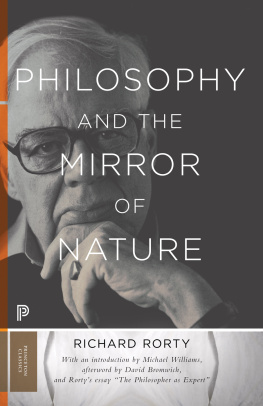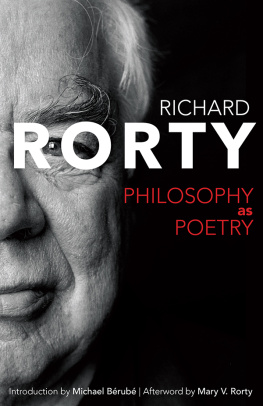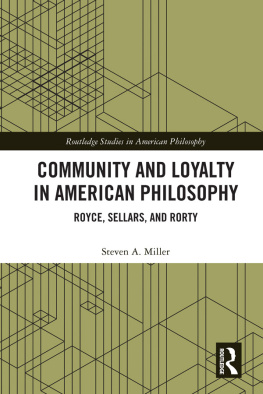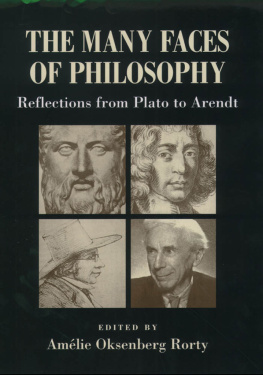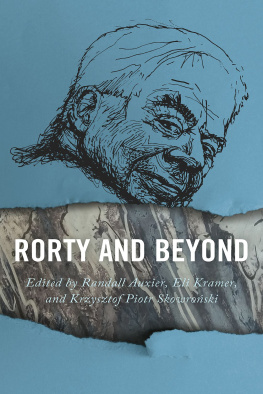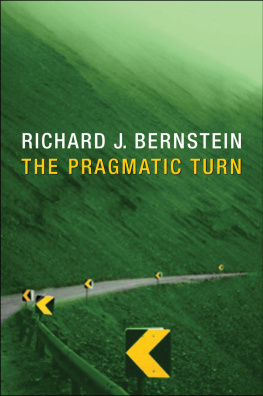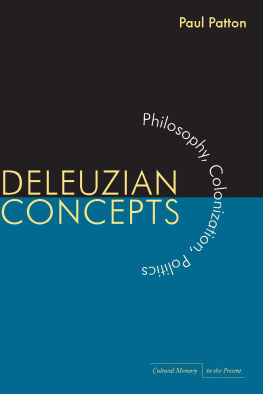Rorty - Philosophy and the Mirror of Nature
Here you can read online Rorty - Philosophy and the Mirror of Nature full text of the book (entire story) in english for free. Download pdf and epub, get meaning, cover and reviews about this ebook. City: Princeton;Oxford, year: 2018;2017, publisher: Princeton University Press, genre: Religion. Description of the work, (preface) as well as reviews are available. Best literature library LitArk.com created for fans of good reading and offers a wide selection of genres:
Romance novel
Science fiction
Adventure
Detective
Science
History
Home and family
Prose
Art
Politics
Computer
Non-fiction
Religion
Business
Children
Humor
Choose a favorite category and find really read worthwhile books. Enjoy immersion in the world of imagination, feel the emotions of the characters or learn something new for yourself, make an fascinating discovery.
Philosophy and the Mirror of Nature: summary, description and annotation
We offer to read an annotation, description, summary or preface (depends on what the author of the book "Philosophy and the Mirror of Nature" wrote himself). If you haven't found the necessary information about the book — write in the comments, we will try to find it.
Rorty: author's other books
Who wrote Philosophy and the Mirror of Nature? Find out the surname, the name of the author of the book and a list of all author's works by series.
Philosophy and the Mirror of Nature — read online for free the complete book (whole text) full work
Below is the text of the book, divided by pages. System saving the place of the last page read, allows you to conveniently read the book "Philosophy and the Mirror of Nature" online for free, without having to search again every time where you left off. Put a bookmark, and you can go to the page where you finished reading at any time.
Font size:
Interval:
Bookmark:

Philosophy and the Mirror of Nature
Philosophy and the Mirror of Nature
RICHARD RORTY
With an introduction by Micheal Williams,
an afterword by David Bromwich,
and Rortys essay
The Philosopher as Expert
PRINCETON UNIVERSITY PRESS
PRINCETON AND OXFORD
Copyright 1978, 2009 by Princeton University Press
Published by Princeton University Press, 41 William Street, Princeton, New Jersey 08540
In the United Kingdom: Princeton University Press, 6 Oxford Street, Woodstock, Oxfordshire OX20 1TR
All Rights Reserved
First edition, 1979
Thirtieth-Anniversary Edition, 2009
First Princeton Classics Edition, 2018
Paper ISBN 978-0-691-17815-8
The Library of Congress has cataloged the prior edition of this book as follows:
Library of Congress Control Number 2008938126
Publication of this book has been aided by a grant from The National Endowment for the Humanities
The afterword by David Bromwich, titled Remembering Richard Rorty, first appeared in Raritan, which has given gracious permission to reprint it here
This book has been composed in Linotype Baskerville and Postscript ITC New Baskerville
Printed on acid-free paper.
press.princeton.edu
Printed in the United States of America
10 9 8 7 6 5 4 3 2 1
TO
M. V. R.
When we think about the future of the world, we always have in mind its being at the place where it would be if it continued to move as we see it moving now. We do not realize that it moves not in a straight line, but in a curve, and that its direction constantly changes.
Philosophy has made no progress? If somebody scratches where it itches, does that count as progress? If not, does that mean it wasnt an authentic scratch? Not an authentic itch? Couldnt this response to the stimulus go on for quite a long time until a remedy for itching is found?
Wenn wir an die Zukunft der Welt denken, so meinen wir immer den Ort, wo sie sein wird, wenn sie so weiter luft, wie wir sie jetzt laufen sehen, und denken nicht, dass sie nicht gerade luft, sondern in einer Kurve, und ihre Richtung sich konstant ndert. (Ludwig Wittgenstein, Vermischte Bemerkungen, Frankfurt, 1977, p. 14.)
Die Philosophie hat keinen Fortschritt gemacht? Wenn Einer kratzt, wo es ihn juckt, muss ein Fortschritt zu sehen sein? 1st es sonst kein echtes Kratzen, oder kein echtes Jucken? Und kann nicht diese Reaktion auf die Reizung lange Zeit so weitergehen, ehe ein Mittel gegen das Jucken gefunden wird? (Ibid., pp. 163164.)
Contents
Introduction to the 2009 Edition
MICHAEL WILLIAMS
In memory of Richard Rorty, teacher and friend.
Philosophy and the Mirror of Nature sent shock waves through the ranks of professional philosophers. Thirty years on, it remains a book that anyone interested in philosophy ought to reador re-read, for Rortys arguments are as vital today as when they first appeared. Rortys book is a visionary work that challenges us to rethink our understanding of the philosophical enterprise. It is the single greatest influence on the revival of American Pragmatism, one of the most exciting developments in philosophy today. Its influence has been felt far beyond the confines of academic philosophy.
Mirror is a work of enormous scope and ambition, ranging over epistemology, metaphysics, philosophy of mind, philosophy of language, and much else besides. However, Rortys intent is less to defend positions within these areas of philosophy than to call into question the very idea of philosophy as a professionalized discipline with a distinctive subject matter.
Rorty sees philosophy, as it came to be understood in the last century, as an attempt to work through the consequences of a conception of knowledge as accurate representation, a conception rooted in the metaphor of mind as the mirror of nature. From its seventeenth-century origins, principally in the writings of Descartes, this metaphor leads to the emergence of what Rorty calls philosophy-as-epistemology, with its canonical list of textbook problems: the mind-body problem, skepticism, the nature of truth, and the rest. According to Rorty, we should not keep trying to solve such problems, which have evolved into forms designed to resist solution. Better to put them behind us.
It is all very well to suggest that certain problems should be set aside. But can they be? To break their intellectual hold on us, we need arguments to convince us that they are dispensable. Further, these arguments must not themselves imply epistemological or metaphysical commitments of the sort that we are trying to escape. This is a tall order. Consider the Logical Positivists, who were as hostile as anyone to traditional philosophical theorizing: because their rejection of metaphysics rests on a paradigm instance of philosophy-as-epistemologythe verifiability theory of meaningthey perpetuate the genre. Appreciating this danger, we might be tempted to seek an exit from philosophy-as-epistemology through the more purely therapeutic strategies that we find in Austin or Wittgenstein. However, his admiration for Austin and Wittgenstein notwithstanding, Rorty is suspicious of the idea that philosophical problems are nonsensical or result from abuses (or misunderstandings) of ordinary language. Anything has a sense if you give it one; and who knows where ordinary ways of talking end and philosophical theory takes over?
Rorty takes a different approach. His way out of philosophy-as-epistemology turns on a broadly pragmatic outlook that he calls epistemological behaviorism. Epistemological behaviorism is not a commitment to reduce mental activity to overt behavior but a methodological stance. As an epistemological behaviorist, he examines human thought and knowledge from a public, third-person standpoint, treating language as communicative and knowledge as the result of argument and discussion. Differences lacking practical import have no theoretical significance either.
Although Rorty eschews the pragmatist label, finding the term a bit overladen (Macarthur and Price, who acknowledge Rortys influence, contemporary pragmatism combines two commitments. The first is to linguistic priority: dont start by asking about the nature of mind, knowledge, etc.; start by asking what we are doing in deploying mentalistic or epistemological vocabulary. This is very much how Rorty proceeds. The second is to antirepresentationalism, which counsels us to avoid approaching our various vocabularies in ways that make theoretical use of representationalist notions such as truth (as correspondence to fact) or reference (e.g., as some naturalistically explicable word-world relation). Antirepresentationalismthe rejection of the idea of mind (or language) as the mirror of natureis the leitmotif of Rortys book.
Rortys pragmatism incorporates a kind of naturalism. This claim may strike those who know something of Rortys work as implausible. Naturalism is often associated with physicalism, just the sort of metaphysical doctrine that Rorty deprecates. But here we can invoke Prices useful distinction between object naturalism and subject naturalism. An object naturalist starts with a view about what sorts of things fundamentally exist, giving himself the task of accommodating things that do not seem to fit easily into his ontological scheme. For example, a physicalistic naturalist will wonder how (or whether) meanings or values find a place in a world of elementary particles. By contrast, a subject naturalist simply takes up an empirical attitude toward human practices.
Next pageFont size:
Interval:
Bookmark:
Similar books «Philosophy and the Mirror of Nature»
Look at similar books to Philosophy and the Mirror of Nature. We have selected literature similar in name and meaning in the hope of providing readers with more options to find new, interesting, not yet read works.
Discussion, reviews of the book Philosophy and the Mirror of Nature and just readers' own opinions. Leave your comments, write what you think about the work, its meaning or the main characters. Specify what exactly you liked and what you didn't like, and why you think so.

